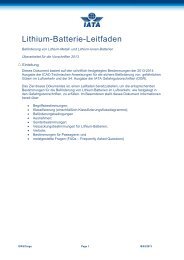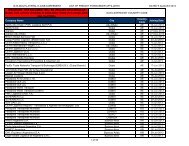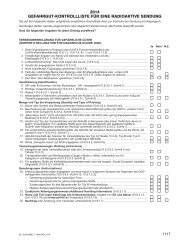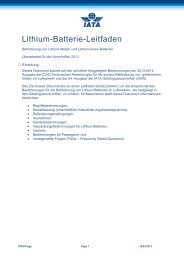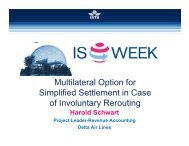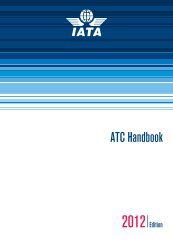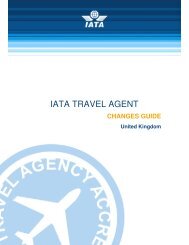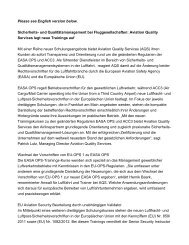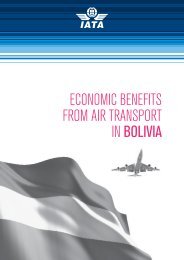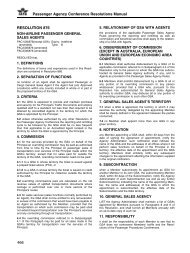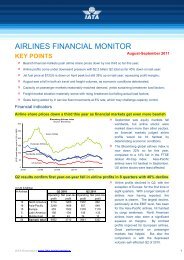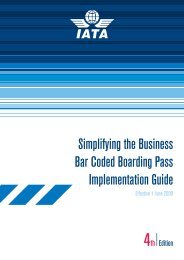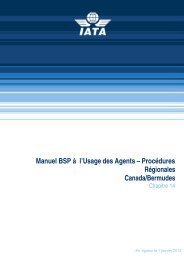You also want an ePaper? Increase the reach of your titles
YUMPU automatically turns print PDFs into web optimized ePapers that Google loves.
COST EFFICIENCY<br />
Paying the right price.<br />
Airport and ANSP charges<br />
cost the equivalent of 11% of<br />
airlines’ annual revenues and<br />
threaten the benefits strong<br />
air transport growth would<br />
bring.<br />
$64<br />
billion<br />
The amount of<br />
infrastructure-related<br />
charges airlines and<br />
passengers pay every year.<br />
11%<br />
of revenues<br />
These charges cost the<br />
equivalent of 11% of<br />
airlines’ annual revenues.<br />
$598<br />
billion<br />
The total industry<br />
revenues for 2011.<br />
As governments look to raise<br />
more tax revenue to stimulate<br />
their economies or reduce<br />
their deficits, the pressure to<br />
raise aviation infrastructure<br />
charges in <strong>2012</strong> is increasing.<br />
Airlines and their passengers<br />
already pay over $64 billion a<br />
year in infrastructure-related<br />
charges. Cost reductions and<br />
even freezes in infrastructure<br />
charges are vital to the battle<br />
for the financial sustainability of<br />
airlines. Governments also need<br />
to understand the link between<br />
increased charges and reduced<br />
aviation connectivity, which, in<br />
turn, leads to longer-term economic<br />
underperformance.<br />
Industry-wide policy change<br />
is essential to build a stronger<br />
framework for cost-efficiency.<br />
The ICAO principles of transparency,<br />
cost-related charges,<br />
meaningful airline consultation,<br />
equitable charge structures<br />
for all airlines, improvements in<br />
productivity, and cost efficiency<br />
must be applied when determining<br />
infrastructure charges.<br />
42<br />
Airports must balance the<br />
need for responsible investment<br />
with competitive<br />
charges.<br />
In <strong>2012</strong>, the Brazilian government<br />
accepted extremely high<br />
bids for the privatization of the<br />
Brasilia, São Paulo Guarulhos<br />
and Viracopos airports. <strong>IATA</strong> is<br />
endeavoring to ensure that the<br />
concessionaires’ performance<br />
is measured by levels of service<br />
and cost-effectiveness, not<br />
simply financial gain. <strong>IATA</strong> is<br />
trying to work with the concessionaires<br />
to find ways to recoup<br />
their large investments through<br />
greater traffic volumes and<br />
improved efficiency, not higher<br />
airport charges. Excessive<br />
airport charges discourage<br />
growth and ultimately damage<br />
job creation and economic<br />
opportunities.<br />
In India, <strong>IATA</strong> continues to argue<br />
that Delhi’s 346% increase<br />
in charges will make it the most<br />
expensive destination in Asia,<br />
jeopardizing its aspiration to<br />
become an international hub.<br />
Amid signs of possible increases<br />
at the country’s other major<br />
airports and a rise in the Indian<br />
service tax on air transport services,<br />
<strong>IATA</strong> is engaging with the<br />
government and air transport<br />
stakeholders to emphasize the<br />
adverse effects of the growing<br />
cost burden on the Indian air<br />
transport sector.<br />
In South Africa, <strong>IATA</strong> helped to<br />
resolve the dispute between<br />
the airport authority and the<br />
aviation regulator over charges<br />
increases. This resulted in<br />
original plans for a 190% price<br />
increase over two years being<br />
modified to a 161% increase<br />
over five years. Clearly, the<br />
regulatory system is not working,<br />
so <strong>IATA</strong> remains active<br />
in this debate, seeking to<br />
strengthen regulatory effectiveness<br />
so that charges reductions<br />
can be delivered in the<br />
near future.<br />
Meanwhile, in some good<br />
news, the bill to reauthorize the<br />
Federal Aviation Administration<br />
in the United States made no<br />
reference to the proposed raise<br />
in the cap on Passenger Facility<br />
Charges, from $4.50 to $7.00.<br />
And in Canada, the need to resolve<br />
the long-standing Crown<br />
Rents issue remains with the<br />
government.<br />
In Europe, the adoption of the<br />
EC Airport Charges Directive<br />
has produced little improvement<br />
in the effectiveness of<br />
consultation or the ability of<br />
airline customers to play a<br />
more influential role in the<br />
setting of airport tariffs. Some<br />
EU member countries have<br />
also been slow to incorporate<br />
the directive’s provisions into<br />
national law.



